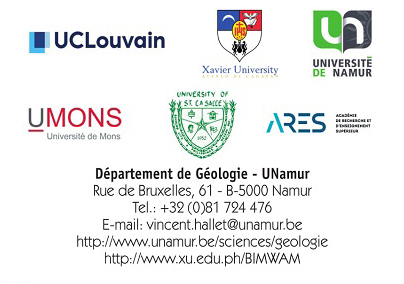BIMWAM
an integrated methodology for an efficient water supply strategy
In January 2018, the 5 years project BIMWAM (Building up an Integrated Methodology for Water resources Assessment and Management in urban coastal areas) started. This project, funded by the ARES-CCD (Académie de Recherche et d’Enseignement Supérieur - Cellule de Coopération au Développement), involves three Belgian universities (UClouvain, UMans and UNamur) and two Philippine ones (USLS Bacolod and XU Cagayan de Oro). The experimental sites are located in the Misamis Oriental Province of Mindanao Island.
In the Philippines, coastal areas are prone to severe anthropogenic pressure in terms of rapid and uncontrolled urbanization. In this context, supplying safe drinking water to the local population is challenging. This is why the BIMWAM team develops, tests and integrates the following innovative approaches:
- Hydrogeological investigations consisting in the compilation of various information in a data base (Spring and well inventories, meteorological data, ...), implementation of hydrogeological maps, location of salt water contaminated aquifers (water analysis, geophysical investigations, ...). Results will help to locate high potential aquifers, to set up production wells, to run hydrogeological models and to manage aquifer resources in a sustainable way.
- Water supply network engineering that assesses the actual water supply network efficiency and will improve it or design new networks according to the groundwater resources estimation and location, the population needs and their financial capacities, ...
- Analyzes of water demand and supply and of the potential impacts of economic, technological and organizational innovation on the supply side. A household survey will enable to geo-spatialize the water needs, to identify the determinants of drinking water demand and to understand how to modify it. The analysis pf the socio-economic fabric will enable to predict changes in economic activities and location choices triggered by change in water quality and supply. Based on the other contributions in hydrogeology and engineering, a decision tool using an integrated digital model will, for the very first time, help public and private decision makers to predict the impacts of their choices in the economic, environmental and public health dimensions and decide accordingly.
By developing these competences and innovative tools for decision making, the BIMWAM team will create with the Xavier University a center of expertise for water studies on coastal areas that will be led by the PhD scientists graduated at the end of the research project. This new generation of researchers, together with their institution, will conduct in a multidisciplinary environment all the scientific analyses required to manage local water resources efficiently.
Département de Géologie - UNamur
Rue de Bruxelles, 61 - B-5000 Namur
Tel.: +32 (0)81 724 476
E-mail: This email address is being protected from spambots. You need JavaScript enabled to view it.
http://www.unamur.be/sciences/geologie
http://www.xu.edu.ph/BIMWAM
Project Coordinators: G. Calalang (XU) and V. Hallet (UNamur).
Scientific committee (Hydrogeology): A Carmona (USLS) and P. Goderniaux (UMons), M. Tan (XU).
Scientific committee (Engineering): S. Soarez (UClouvain).
Scientific committee (Socio-Economic): I. Adant (UClouvain), C. Almaden (XU) and R. Yap (XU).
PhD researchers: M. Sabines (XU) and A. Agban (XU).

Download the Company Profile here.
